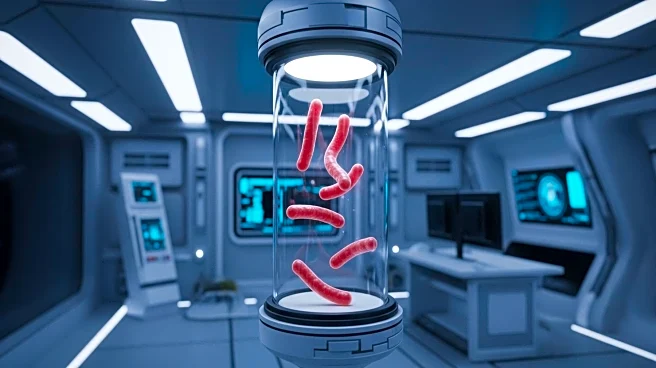What is the story about?
What's Happening?
Researchers at RMIT University have discovered that Bacillus subtilis, a bacterium vital for human health, can withstand the extreme conditions of space travel. The study involved launching bacterial spores aboard a sounding rocket to the edge of space, where they endured intense forces, microgravity, and re-entry into Earth's atmosphere. The bacteria maintained their structure and grew normally after the ordeal, indicating their potential to support astronaut health on extended space missions. This finding is significant for future human missions to Mars, as the survival of beneficial bacteria is crucial for maintaining astronaut health during prolonged space travel.
Why It's Important?
The resilience of Bacillus subtilis in space travel is a promising development for long-term human missions to Mars and beyond. Ensuring the survival of beneficial bacteria is essential for maintaining physiological functions and supporting the immune system during space travel. This research could lead to biotechnology innovations on Earth, including the development of new antibacterial treatments and strategies to combat antibiotic-resistant bacteria. The study's insights into microbial survival limits could inform the design of life support systems and countermeasures against space-induced health issues.
What's Next?
The success of Bacillus subtilis in surviving a real space launch provides a robust basis for further research. Future studies could explore the resilience of more delicate organisms, bringing humanity closer to establishing a sustainable and healthy presence on Mars. The research team is seeking additional funding to expand life science experiments in microgravity environments, with the aim of advancing our understanding of microbial survival in space. Pharmaceutical companies might also use this foundational data for life science experiments in microgravity environments.
Beyond the Headlines
Understanding microbial endurance under high acceleration, near-weightlessness, and rapid deceleration is crucial for developing sustainable life support systems for space travel. The study's findings could influence various aspects of space exploration, from the design of life support systems to the development of countermeasures against space-induced health issues. Moreover, the insights gained from this research could have implications for biotechnology and healthcare on Earth, particularly in the realm of combating antibiotic resistance.
















